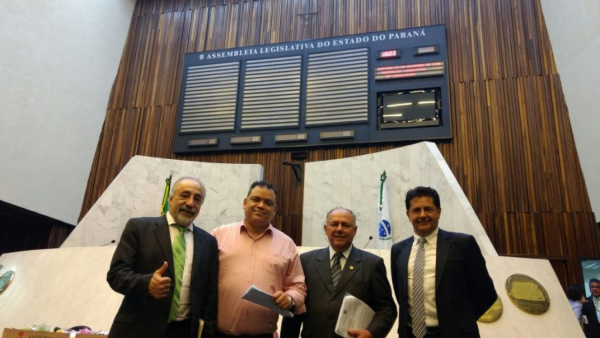The exploration of shale gas will be suspended for 10 years in order to protect food production and surface and ground water reservoirs

Rasca Rodrigues (on the left), Juliano Bueno de Araujo, José Carlos Schiavinato and Claudio Palozi support and are a part of the movement against fracking in the Paraná state and the whole of Brazil. Photo: COESUS/350.Brazil
The State of Paraná, located in the South of Brazil, will be free from the threat of fracking – a highly polluting technology for extracting shale gas from the subsoil – for at least 10 years.
That’s what has been laid out in state bill 873/2015, which was approved by the Legislative Assembly of the State of Paraná (ALEP) this Monday 28th November. 45 deputies voted for a 10-year suspension of the licensing for exploring shale gas through this unconventional method. Now that the bill has passed, we must wait for the Executive’s sanction to come into force.
“This is an unprecedented decision, putting Paraná once more in the front line of the fight against fracking and demonstrating that there is already an understanding among the members of the parliament that this is a dangerous, destructive mining technology which causes irreversible environmental, economic and social impacts,” said Juliano Bueno de Araujo, Latin America Climate Change Campaigns Coordinator and founder of COESUS – No-Fracking Brazil Coalition Coalizão Não Fracking For The Climate, Water and Life.
Based on international studies, the main argument stated by the authors of the bill is the risk of soil and water contamination that may affect the 122 municipalities where the exploration would technically occur. In 2013, the Brazilian National Agency of Petroleum, Natural Gas and Biofuels (ANP) has awarded 72 gas exploration blocks in the country, 16 of them located in Paraná, affecting the West, South-West and North-West of the State.
For 350.org Brazil Director, Nicole Figueiredo de Oliveira, who was also present at the ALEP during the voting of the bill, this suspension is an important victory against fracking – however, it does not guarantee that the population will be safe. “The threat of productive soil and water reservoirs contamination, as well as of diseases such as cancer, remains. This makes society very concerned. The No-Fracking Brazil campaign continues to inform and mobilise for a definitive ban, definitely removing the Paraná State and Brazil from the fracking route.”
Risks and dangers
For state congressman, José Carlos Schiavinato, one of the bill’s authors, this technology would have a negative influence on agricultural activities and contribute to water table contamination. “We went to Argentina and we saw the difficulties that small-scale pear and apple farmers are having in commercialising their production,” said the deputy, who was in the Rio Negro and Neuquén region in November 2015. The mission organised by COESUS and 350.org brought Brazilian legislators together to meet locally to get a closer look at the devastation caused by fracking in the neighbouring country.
During the voting, Schiavinato commented on the importance of the municipalities also legislating for the ban, as a way of protecting their agricultural production and the health of the people, and of preventing new seismic activity in the region, including the one caused by seismic tests.
Rasca Rodrigues, another state congressman who visited Argentina, highlighted the understanding of the vast majority of the members of the parliament (from different parties and groups) regarding environmental risks. “There are many studies demonstrating the impacts caused by the materials used for fracking, many of them toxic, carcinogenic and even radioactive. This way, we are confident that we will be able to stop fracking until we can be sure about its consequences,” he explained. The proposal was signed by José Carlos Schiavinato, Marcio Nunes, Marcio Pacheco, Guto Silva and Cristina Silvestri.
Congressman Claudio Palozi has spoken as well, highlighting the importance of prohibiting seismic acquisition tests, such as those that the ANP is conducting at the North and Pioneering North of the Paraná. “We have to improve this law, as well as suspend the earthquake-inducing tests with vibrating trucks which are causing both panic among the people of Paraná as well as damages.”
Palozi defends that these tests should also depend on the Environmental Impact Analysis (EIA) and Environmental Impact Report (RIMA) like those required for other activities, “since they can cause as much impact as the gas exploration itself”.
Since December 2015, the Global Service company has been conducting seismic acquisition tests in dozens of Paraná cities, causing induced earthquakes that have damaged many buildings and have brought fear to the population.